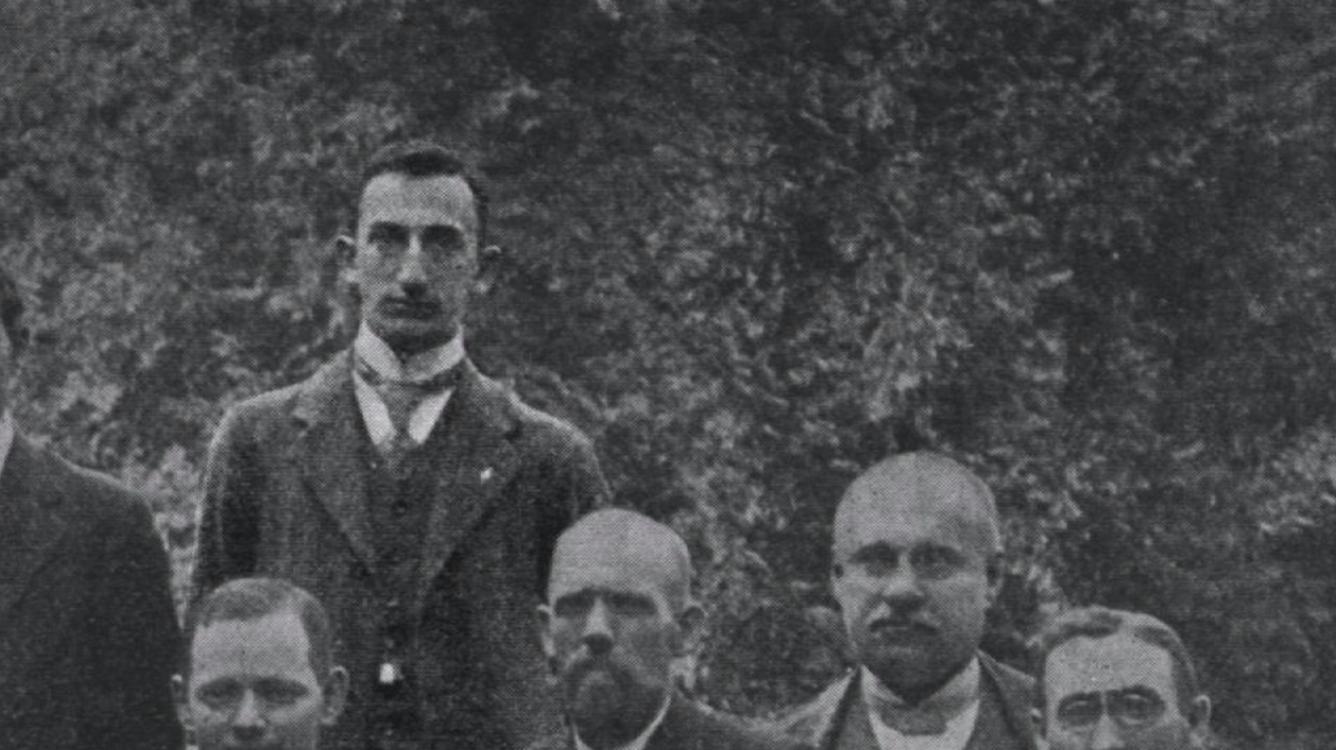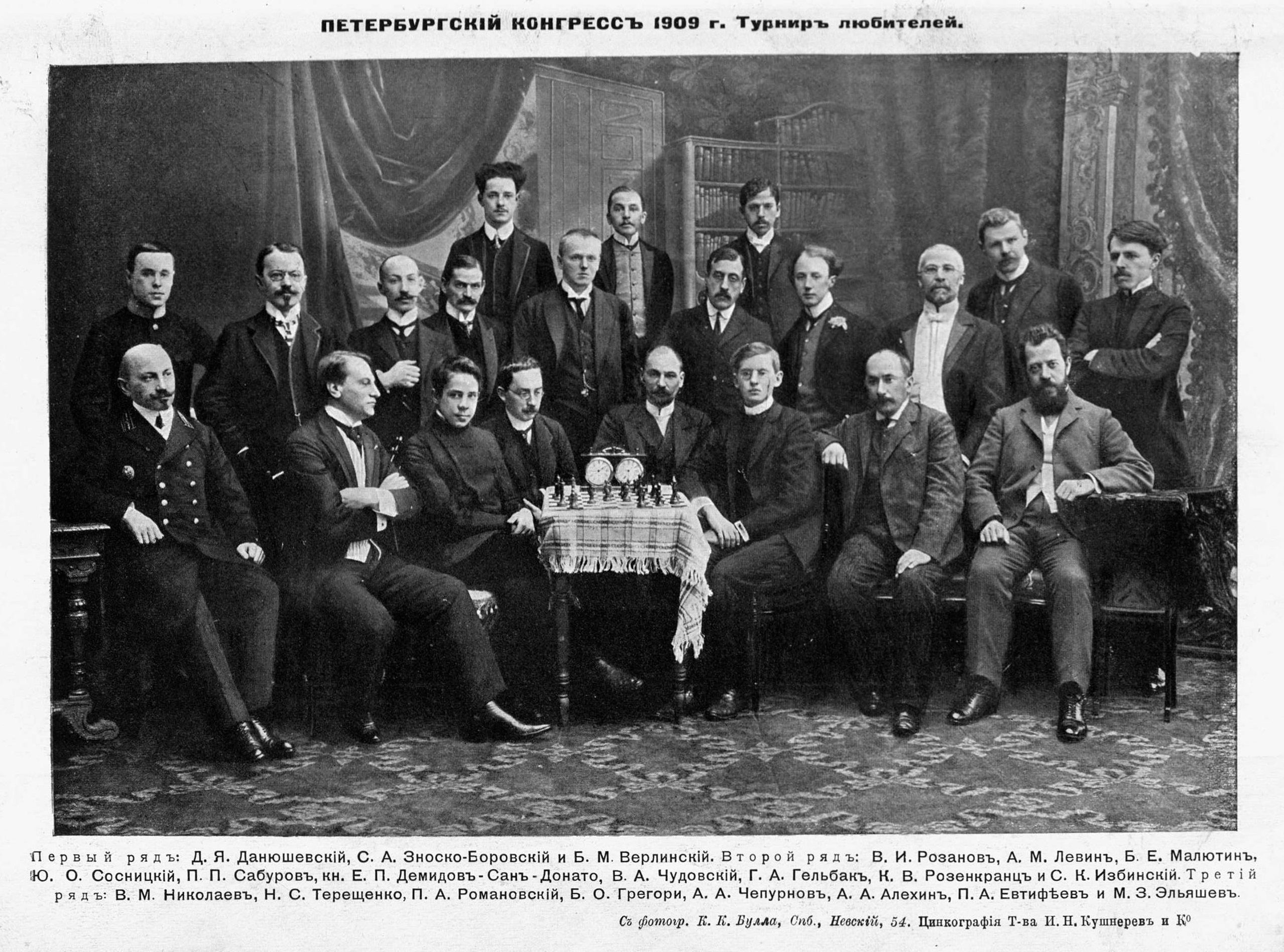
Georg Rotlewi...
Georg Rotlewi [or Gersz Rotlevi], a Polish chess master of Jewish origin, born in Lodz [at the time Russian Empire, now POL] in 1889, is mostly remembered for the Rubinstein's immortal. A fascinating game played in Lodz in 1907, where Akiba sacrificed Q & R to mate his opponent...
Rubinstein's gem
_
Rotlewi was a Rubinstein's pupil, something that can also be concluded with a first look in databases, where his first games since 1906 are all against Akiba in Lodz. Most of them, as it would be expected, were won by Rubinstein. However I've tracked one in a 1912 newspaper won by Georg [this with some more of his games at the end of this post]. But generally few things are known about Rotlewi's life, something that motivated me to gather as many as I could...
_
St Petersburg 1909, all Russian amateur with two photo mysteries
Rotlewi first chess success was in all Russian amateur tournament, St Petersburg 1909, where he finished second with 12/18, just 1 point below first Alekhine. In this tournament Romanovsky and Maljutin had made their appearance too. Noticeable are 2 photos of this tournament concerning Rotlewi...

In the family photo of the tournament, and after checking the names at the bottom, I couldn't track Georg Rotlewi, although he was second in the final results and as it would be expected, he should be seated on the other side of the chess table, opposite to Alekhine. Another absent in this photo was Sergey Lebedev.
_

_
What exact position of the game is presented in the above photo?? This mismatch is underlined by the fact that the other known tourney photo, of the Alekhine - Romanovsky game [you can check it in kevinspraggettonchess], does correspond to an actual played position.
Some mysteries?! Just an occasion to show these two beautiful photos!
_
After 1909 mainly in Germany
During summer of 1910 he participated in the Hauptturnier A of 17th DSB Congress, Hamburg 1910, that actually won earning his master title [WSZ 1910, 338]. Then in Dec 1910 he tied with Rubinstein for the first place within Warsaw 1910 [WSZ 1911, 60]. In Warsaw he earned a brilliancy prize for his game against Bogoljubov. In May 1911 he came second after Alapin in a four player tournament in Munich [WSZ 1911, 238] and during Aug 1911 he tied for second within Cologne 1911, Hauptturnier A [WSZ 1911, 379], just before Karlsbad.
During these years Rotlewi seems that met Ernst Jünger, german soldier mostly known for his Memories on WW1, but then a child. The latter, in his book Subtile Jagden, 1967 [in archiveorg], devotes some paragraphs on Georg. I couldn't track exactly the dates, but as the title chapter is Rehburger Reminiszenzen where [Rehburg] Jünger could be found with his family during the years 1907-1912 according to his bio, it should be after Hamburg 1910 and before Karlsbad 1911.
Jünger remembers that his father met Rotlewi at the Romanischen Cafe, probably the famous one in Berlin, where Georg was playing with amateurs for 50 pfennigs or a mark. One mark of 1911 should be equal to a little more of 6$ of our time, as I found in web. Rotlewi seems that preferred kids' company rather than Jünger's father's. Jünger describes some walks with him. During one he gives some lines of a dialogue:
"Mr Rotlewi, I cannot bear it any longer. I don't understand why you are so sad."
"What is a life without the sparkle of love?"
[="Der Vater hatte ihn im Romanischen Cafe kennengelernt, wo er mit Amateuren spielte, die Partie um fünfzig Pfennig oder, wenn es hoch kam, um eine Mark." in p. 12. "Er streifte lieber mit uns Kindern durch die Gegend, als daß er mit dem Vater spielte, und wurde zum unermüdlichen Wanderer, doch ging er ungern allein." in p. 13. "Herr Rotlevi, ich halte das nicht länger aus. Ich kann nicht begreifen, warum Sie so traurig sind.""Was ist ein Leben ohne Liebesglanz?", in p. 18 //Jünger as source was indicated by Hans Ree in here].
_
Karlsbad 1911
This was I think Rotlewi's greatest success. He ended 4th and he could even came in 1st place if he had won the last 3 games, one of which was against the winner Richard Teichmann. Around Karlsbad 1911, an interesting passage is given by Mark Dvoretsky, in his Chess Lessons, pp. 138-139, where he translates some lines of Levenfish's Selected games and memories:
"Young Rotlewi fought wonderfully and vanquished mighty opponents in excellent fashion. Among those were Schlechter, Nimzowitsch, Marshall, Spielmann. After round 17, Rotlewi, Teichmann and Schlechter shared the lead, Rubinstein trailing by a point and a half. Chess journalists started to stir; interviews with a brand-new star begin to appear.
Rotlewi came from a very poor family and his suit was a plain evidence of this sad fact. City councilor Tietz became upset. Just think of it, the prizewinner of the Karlsbad tournament walks around in trousers that obviously belong to his younger brother! Tietz made Rotlewi an advance against his future prize money suggesting that the latter should buy himself new clothes. The next day Rotlewi came in wearing a fine suit and shiners. With kronen ringing in his pocket, he was unrecognizable...
Unfortunately, it turned out that Tietz had done more harm than good to Rotlewi. Having become a dandy, the player got carried away with the resort’s entertainments and forgot about chess. In the final rounds Rotlewi lost several games and finished only fourth.
Soon after the tournament, Rotlewi had fallen sick with mental derangement and the chess career of this most talented master was over."

_
After Karlsbad in Netherlands
After Karlsbad, I've tracked his name in the Dutch press. A 28-board simul is mentioned in De Maasbode of 06-11-1911, where he achieved +18=9-1. Towards the end of the year he played a 5 game match against Johannes Esser, a doctor and Dutch champion for 1913 who is mostly known for his activity & surgery methods as a plastic surgeon for the WW1 victims. At the time he was writing the chess column of Algemeen Handelsblad.
This 5 game match ended with +2=3 for Esser [ed.26.04.2019 the correct results are +3=2, as occurs from Algemeen Handelsblad of 02-03-1912, after indication in the Quarterly for Chess History, shared by @Simaginfan. WSZ was inaccurate on this], but it seems that Rotlewi was forced to abandon as he had to leave Netherlands. A relative passage can be found in WSZ 1912, 113. There, after the score is given, it's underlined Esser's secrecy and confidentiality, keeping results secret long enough. WSZ mentions that Rotlewi, after Karlsbad, was suffering "from a severe neuropathy which made his entry into a sanatorium necessary. Under these circumstances, Dr. Esser as Rotlewi's medical consultant committed to avoid anything that could affect the state of mind of his patient unfavorably."
[="Amsterdam. Rotlevi spielte Ende Dezember mit Dr. Esser einen Wettkampf, der nicht beendet werden konnte, da Rotlevi sein Domizil wechselte. Das Resultat von — 2 bei 3 Remisen von 5 Partien war für den jungen Meister so wenig erfreulich, daß zwischen den holländischen Schachredakteuren ein Übereinkommen getroffen wurde, nichts zu veröffentlichen, um einer Beteiligung des Meisters am San Sebastian-Turnier nicht zu schaden. Da die Beteiligung nicht erfolgte, so liegt länger kein Grund zur Geheimhaltung des Resultates vor. Anmerkung der Redaktion. Die zarte Rücksicht, mit der sich Dr. Esser zum Schweigen verurteilte, ist ein Zeugnis seiner noblen Ge Gesinnung. Das "Übereinkommen" und die "Geheimhaltung" wäre gleich gleichwohl nicht zu billigen, wenn nicht triftigere Gründe als Rotlewis Niederlage maßgebend gewesen wären. Es dürfte daher im Interesse aller Beteiligten liegen, hier die wahre Ursache anzugeben. Rotlewi ist kurz nach seinem großartigen Erfolg in Karlsbad an einem schweren Nervenleiden erkrankt, welches seinen Eintritt in ein Sanatorium notwendig machte. Unter diesen Umständen sah sich Dr. Esser als Rotlewis ärztlicher Berater verpflichtet, alles zu vermeiden, was den Gemütszustand seines Patienten hätte ungünstig beeinflussen können." from WSZ 1912, 113.]
The entrance in Sanatorium totally agrees with Winter's CN 5207, where [reproducing Tadeusz Wolsza's Arcymistrzowie, mistrzowie, amatorzy, pp 100-108] is written that Rotlewi died in Lodz in 1920 and had previously contracted tuberculosis. It also agrees with Jünger who is mentioning some breath problems since 1910s [="er litt an Atemnot"].
The confidentiality, that as WSZ writes there was no reason to continue, comes to justify the publication by Esser of the 2 won games in Algemeen Handelsblad of 23-03-1912, with a 2 month delay [in jpeg]. Anyway... One Esser's won game as couldn't track it in databases. The other was lost by a Rotlewi's pure blunder.
_
Rotlewi disappears after this. The only thing I've tracked is a lost game vs Tereschtschenko in St Petersburg 1914, published in De Telegraaf of 20-05-1921.
_
Some Rotlewi's games that I've liked
Against Romanovsky within all Russian amateur 1909. Romanovsky had shown some good performance winning even first Alekhine.
_
A win against Rubinstein in Lodz in 1910. Firstly published by Esser in Algemeen Handelsblad of 13-01-1912 [& in jpeg], during the days of the Rotlewi-Esser match.
_
The brilliancy vs Bogoljubov...
_
And two games +puzzle from Karlsbad 1911
_
_
....
